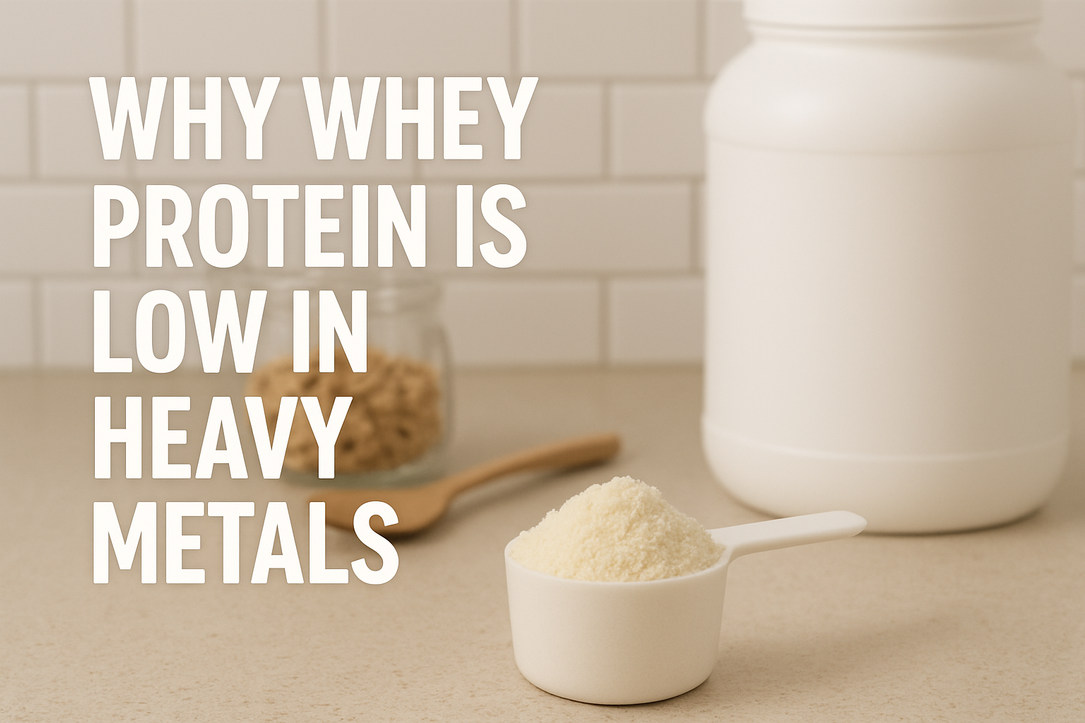Posted by Kaha Nutrition on 18th Sep 2025
Why Whey Protein Is Low in Heavy Metals
When shopping for protein powders, many people worry about heavy metals in protein powders. Reports of lead, cadmium, arsenic, and mercury found in certain supplements—especially plant-based ones—have raised concerns: Is whey protein safe?
The good news: whey protein is naturally low in heavy metals compared to many plant-based alternatives. Here’s why.
What Are Heavy Metals in Protein Powders?
Heavy metals like lead, arsenic, mercury, and cadmium are toxic substances that can build up in the body over time. Chronic exposure is linked to health issues including kidney damage, bone weakness, and neurological problems.
That’s why consumers are rightfully asking: which protein powders have the lowest heavy metals? Whey protein consistently comes out on top.
1. Whey Protein’s Dairy Origin = Lower Heavy Metal Risk
The first reason whey protein is safer is its source. Whey protein comes from milk, a dairy product. Since milk is filtered through the cow’s biological system, it doesn’t accumulate heavy metals at the same rate as plants.
In contrast, plant proteins like pea, rice, and soy can absorb heavy metals from soil and rain. When concentrated into powders, those metals can become more significant.
Key takeaway: Whey protein starts cleaner because it comes from milk, not soil.
2. Advanced Filtration Reduces Contaminants
Whey protein undergoes multiple filtration and purification steps:
-
Microfiltration/ultrafiltration – separates fats and impurities.
-
cross-flow filtration – further isolates protein.
-
Drying into powder – creates the final supplement.
These processes don’t just concentrate protein—they also remove potential contaminants, including heavy metals. That’s why whey protein isolate often has negligible or undetectable heavy metal levels.
3. Stricter Regulation of Dairy Products
Because whey protein is derived from milk, it falls under strict food safety regulations in most countries. Dairy is closely monitored for contaminants, including heavy metals, ensuring whey protein is consistently safe.
Plant-based protein powders, especially those sourced overseas, may not always be held to the same standards, leading to variability in heavy metal content.
4. Independent Lab Testing Supports Whey’s Safety
Consumer Reports and other independent labs have compared heavy metal levels in protein powders. Their findings consistently show that whey protein powders contain little to no detectable heavy metals, while some plant-based powders occasionally exceed recommended safety limits.
5. Is Whey Protein the Safest Protein Powder?
For anyone concerned about how to avoid heavy metals in protein powder, whey protein is a great choice:
-
Naturally low in heavy metals
-
Thoroughly filtered during processing
-
Subject to strict dairy regulations
-
Backed by independent testing
If you’re plant-based, choose powders from reputable brands that uses seed based proteins like hemp and pumpkin seeds, which are generally low in heavy metals.
Final Thoughts
Heavy metals in protein powders are a real concern—but whey protein is one of the cleanest, safest options available. Thanks to its dairy origin, advanced filtration, and strict regulation, whey protein almost always tests well below heavy metal safety limits.

